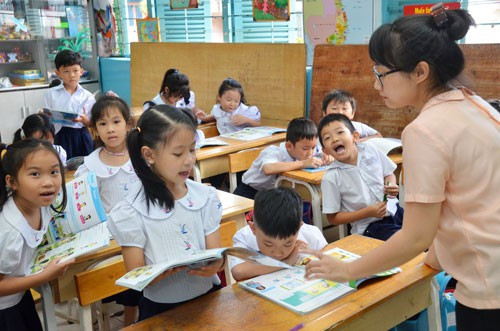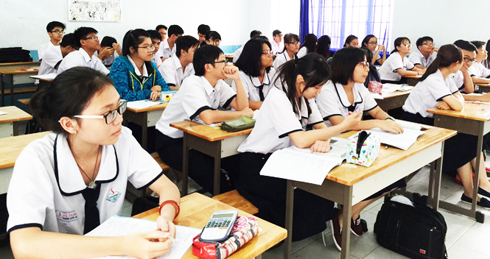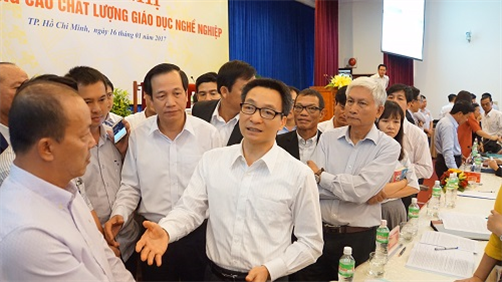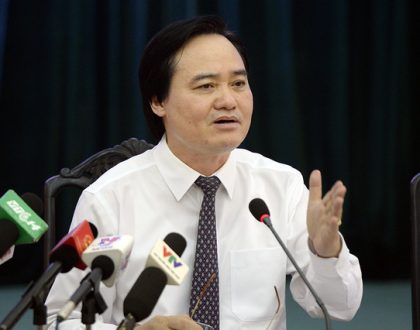Recently, Thu Ky Luat provided information to address the issue of whether primary and secondary school teachers without a bachelor's degree need to pursue further education to meet the required standard. Additionally, many Clients and Members are concerned about whether they need to continue their studies if they graduated from a College program but their degree states 'bachelor'.

Teachers with Associate's "Bachelor's" Degrees Still Required to Upgrade Standards
The editorial board of THU KY LUAT would like to clarify as follows: Elementary or secondary school teachers who graduated from a college program but have diplomas stating “bachelor” must still pursue further education to meet University standards as stipulated in Article 72 of the Education Law 2019.
To be specific, Article 72 of the Education Law 2019 stipulates as follows:
1. The prescribed training levels for educators are defined as follows:
a) Possessing a college diploma in education or higher for preschool teachers;
b) Possessing a bachelor's degree in teacher training or higher for elementary, middle school, and high school teachers.
In cases where a sufficient number of teachers with a bachelor's degree in teacher training is unavailable for certain subjects, a bachelor's degree in a relevant specialization along with a certificate in pedagogical skills is required;
…
Specifically, this regulation mandates that from July 1, 2020, elementary and secondary school teachers must have a University level education or higher. The term “bachelor” in this context exclusively refers to individuals who have graduated from a University, not those who have completed a college program whose diploma states “bachelor.”
The confusion among many teachers about whether they need to upgrade their qualifications under the new regulation stems from a misunderstanding of legal definitions.
To be specific, under the current provision in the Amended Higher Education Law 2018, a bachelor’s degree is a diploma awarded to individuals who have completed a university-level education within higher education. However, the term "bachelor" is also included on the diplomas of those who graduate from certain specified college programs. Specifically, the Vocational Education Law 2014 mandates that graduates of college-level vocational education are awarded a college diploma and are conferred the title of either practical bachelor or practical engineer. This stipulation is detailed in Circular 10/2017/TT-BLDTBXH, which specifies that college diplomas may include the term “practical bachelor” for those in fields of natural sciences, social sciences, and humanities, and “practical engineer” for those in technical and technological fields.
“This title serves to both affirm and honor graduates with college-level practical skills equivalent to those of a bachelor or engineer. It does not complicate matters for graduates but rather enhances the value of a college-level education,” said Dr. Nguyen Hong Minh, Director General of the Directorate of Vocational Education and Training.
Thus, the term “bachelor” currently applies to two distinct groups:
- University Bachelors: Those who have graduated from a university according to the Higher Education Law.
- Practical Bachelors: Those who have graduated from a college according to the Vocational Education Law.
The term “bachelor” as prescribed in Article 72 of the Education Law 2019 refers exclusively to those in the first group, meaning graduates of a university teacher-training program. As such, individuals who have graduated from a college but have diplomas indicating “practical bachelor” are still required to pursue further education to meet the new standards.
Mr. Hoang Duc Minh, Director of the Department of Teachers and Educational Managers, also stated that upgrading training standards to the university level is necessary and aligns with regional and global trends, as emphasized by Resolution 29-NQ/TW: "The goal is for all elementary, middle school, and high school teachers, as well as teachers and lecturers at vocational education institutions, to achieve at least a bachelor's degree and have pedagogical skills to address current inadequacies in the teaching workforce's quality, quantity, and structure and to keep pace with educational innovation and development."
The process of upgrading the standard training levels for elementary and secondary school teachers will be implemented according to a unified plan. Specifically, the Third Draft of the Decree outlining the roadmap for upgrading training qualifications for preschool, elementary, and secondary school teachers is expected to take effect in 2020.
From July 1, 2020, preschool teachers with at least 7 years remaining until retirement, elementary school teachers with intermediate level qualifications with at least 8 years remaining, and elementary and secondary school teachers with college qualifications with at least 7 years remaining must upgrade their qualifications. Teachers who do not meet these timelines due to fewer years of service will not be required to follow this qualification upgrade roadmap. The Ministry will direct educational universities to collaborate closely with local regions to develop training upgrade plans in conjunction with new curriculum training. The training will be phased across grade levels in flexible, practical, and effective formats, avoiding a focus on mere credential attainment.
According to this Third Draft, the general roadmap for qualification upgrades will span from July 1, 2020, to December 31, 2030. During this period, from July 1, 2020, to December 31, 2025, 60% of preschool and middle school teachers and 50% of elementary school teachers are expected to meet the new qualification standards. By January 1, 2026, to December 31, 2030, 100% of preschool, elementary, and middle school teachers should meet the new standards as stipulated by the Education Law 2019.
Nguyen Trinh
 Article table of contents
Article table of contents





.Medium.png)
.Medium.png)
.Medium.png)
.Medium.png)
